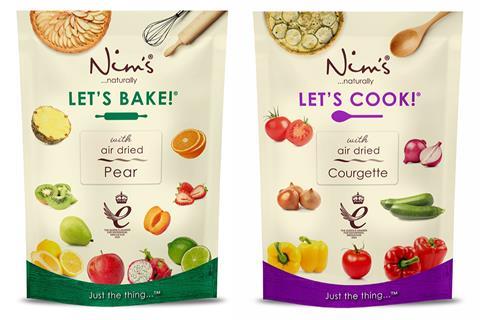Kent-based company has expanded far beyond its original lineup of fruit crisps
Air-dried fruit and veg specialist Nim’s Fruit Crisps has been renamed ‘Nim’s… Naturally’.

Founder Nimisha Raja explained that the change reflected the company’s growing range of products, which have diversified from air-dried fruit and vegetable crisps to incorporate drink garnishes, botanicals, ingredients and edible teas.
The change in name has led to a tweak to the brand identity and launch of a new website.
The Sittingbourne-based company has now passed the 65-product milestone and employs 18 people at its BRC-accredited factory. It is also now preparing to launch a range of air-dried ingredients under its Let’s Cook and Let’s Bake brands.
“When we started it was all about our air-dried fruit crisps and that was reflected in our original identity,” explained Raja, who launched the business in 2017.
“Whilst our crisps are still hugely popular, our new product development team has been in overdrive and we needed an overarching brand that touched on all the different things we make and supply into retail and foodservice, including Holland & Barrett, Pret a Manger, Zizzi and a host of others.
“The one thing that is constant is that all our products are made using just one ingredient and that is why we wanted to trademark ‘Nim’s…Naturally’. I want shoppers to pick up one of our products - whether it is crisps, drink garnishes, ingredients or teas - and immediately know that it is 100 per cent natural.
“They don’t need to turn the pack over to look at the ingredients label, they just automatically trust that anything with our logo has been carefully processed to retain great natural flavour and nutritional goodness without absolutely anything added to flavour, preserve or enhance the one-ingredient products.”
The ‘Nim’s…Naturally’ range is fat, allergen, gluten and dairy-free, while also being vegan friendly and Kosher and Halal certified.
The company also achieved zero food waste in March 2023. That means that all 600 tonnes of fresh produce it uses every year goes into its products, with the small amount (0.003 per cent) that doesn’t sent to an anaerobic waste treatment plant and turned into energy.



